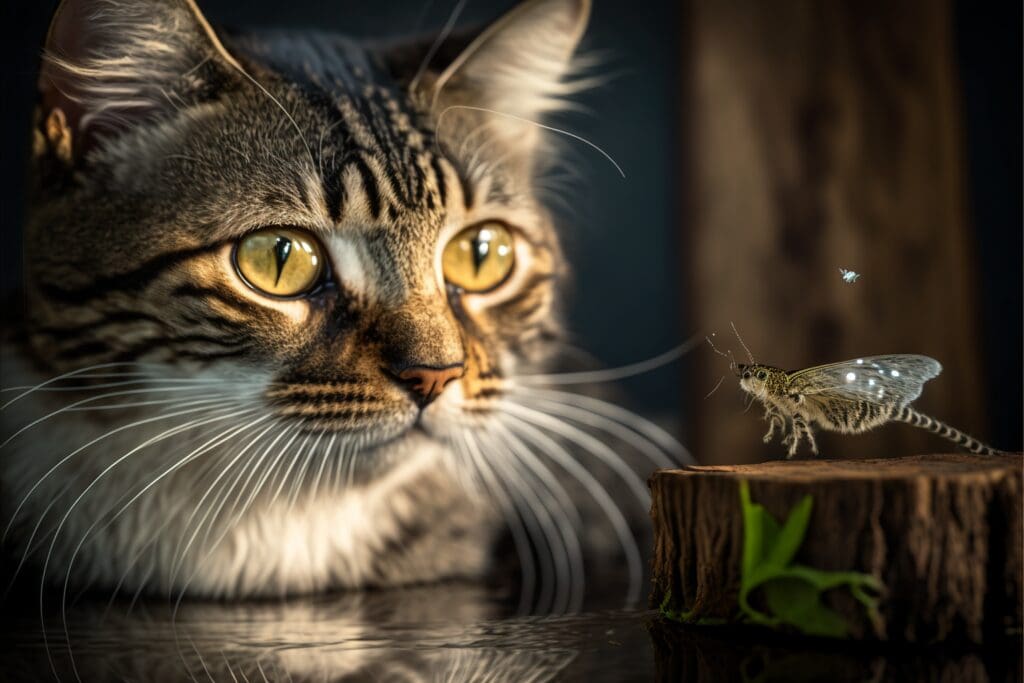Last Updated on January 7, 2023 by admin
The answer to the question: “can cats eat dragonflies?” is yes. Dragonflies are not toxic to cats at all, and they don’t pose any risk to your pet when ingested. In fact, some cats actually enjoy hunting and playing with dragonflies. However, these insects may bite cats if provoked, and if your cat manages to catch one, you should make sure it doesn’t swallow it whole. Additionally, dragonflies are high in protein and fat, so it’s important to avoid overfeeding your cat with these insects. Before feeding dragonflies to your cat, make sure that the particular insect is safe for consumption.
Introduction to Dragonflies
Dragonflies can be a great source of entertainment for cats, as they often fly around gardens and parks. Not only do they provide amusement, but they can also be a nutritious snack for cats. In this article we’ll discuss if cats can eat dragonflies, the nutritional benefits and types of dragonflies that are safe to eat, and common health issues associated with eating dragonflies. Read on to learn more!
Nutritional Benefits of Dragonflies for Cats
When it comes to nutritional benefits, dragonflies are a great source of protein, fats, and vitamins. They also contain calcium, magnesium, potassium, and iron. These nutrients are essential for cats to remain healthy and active. In addition, dragonflies are a low-calorie snack that can help cats maintain their ideal weight. The combination of protein, fats, and vitamins make dragonflies an excellent snack to supplement a cat’s diet.
What Types of Dragonflies Can Cats Eat?
Cats may not be able to digest dragonflies as easily as other types of small insects, so it is important to make sure that the dragonfly is suitable for your pet’s diet. Common types of dragonflies that cats can eat include damselflies, darners, and skimmers. While these dragonflies are generally safe for cats to eat, they should only be given in moderation. It is also important to note that the size of the dragonfly should be taken into consideration, as larger dragonflies may be too large for cats to swallow.
Common Health Problems Associated with Eating Dragonflies
While there is no risk of your cat being poisoned by eating dragonflies, there are some potential health risks associated with them. Dragonflies can sometimes carry parasites and bacteria that can be harmful to cats, so it is important to be aware of this before feeding them to your cat. Additionally, dragonflies have hard exoskeletons, which can cause digestive problems if ingested by cats. If you notice any signs of distress or discomfort after your cat has eaten a dragonfly, it is best to take them to the vet for an exam.
What Insects Are Dangerous for Cats to Eat?
It is important to remember that not all insects are safe for cats to eat. Some insects can be dangerous and even poisonous to cats if ingested. This includes bees, wasps, and fireflies. These insects contain toxins that can be harmful to cats if they consume too much. It is always best to keep your cat away from these types of insects and to never allow them to eat them.
What Insects Are Safe for Cats to Eat?
Dragonflies are one of the many insects that are safe for cats to eat. They provide an excellent source of nutrition and exercise, as they provide a challenge to your cat’s hunting instincts. Dragonflies are not poisonous to cats, and they can’t harm them in any way except perhaps occasionally biting them. Be sure to keep an eye on your cat if they start playing with dragonflies, as some cats may try to eat them out of curiosity. Overall, dragonflies are a great source of nutrition and exercise for cats, without posing any serious health risks.
Cats are naturally born predators and enjoy hunting and eating smaller insects. It is generally safe for cats to eat non-venomous, non-stinging household and garden-variety insects such as houseflies, grasshoppers, ants, moths, gnats, flies, moths, and butterflies. Cats may also eat cockroaches, beetles, crickets, and grasshoppers. While these insects are not toxic to cats, they may cause digestive issues if ingested. For example, the hard exoskeleton of some insects can be difficult for cats to digest. To provide additional nutrition for your cat, Lovebug produces a kibble that harnesses the nutritional richness of these insects. Cats can be given small insect snacks such as grasshoppers, however it is important to note that eating too many insects can be problematic for cats.
